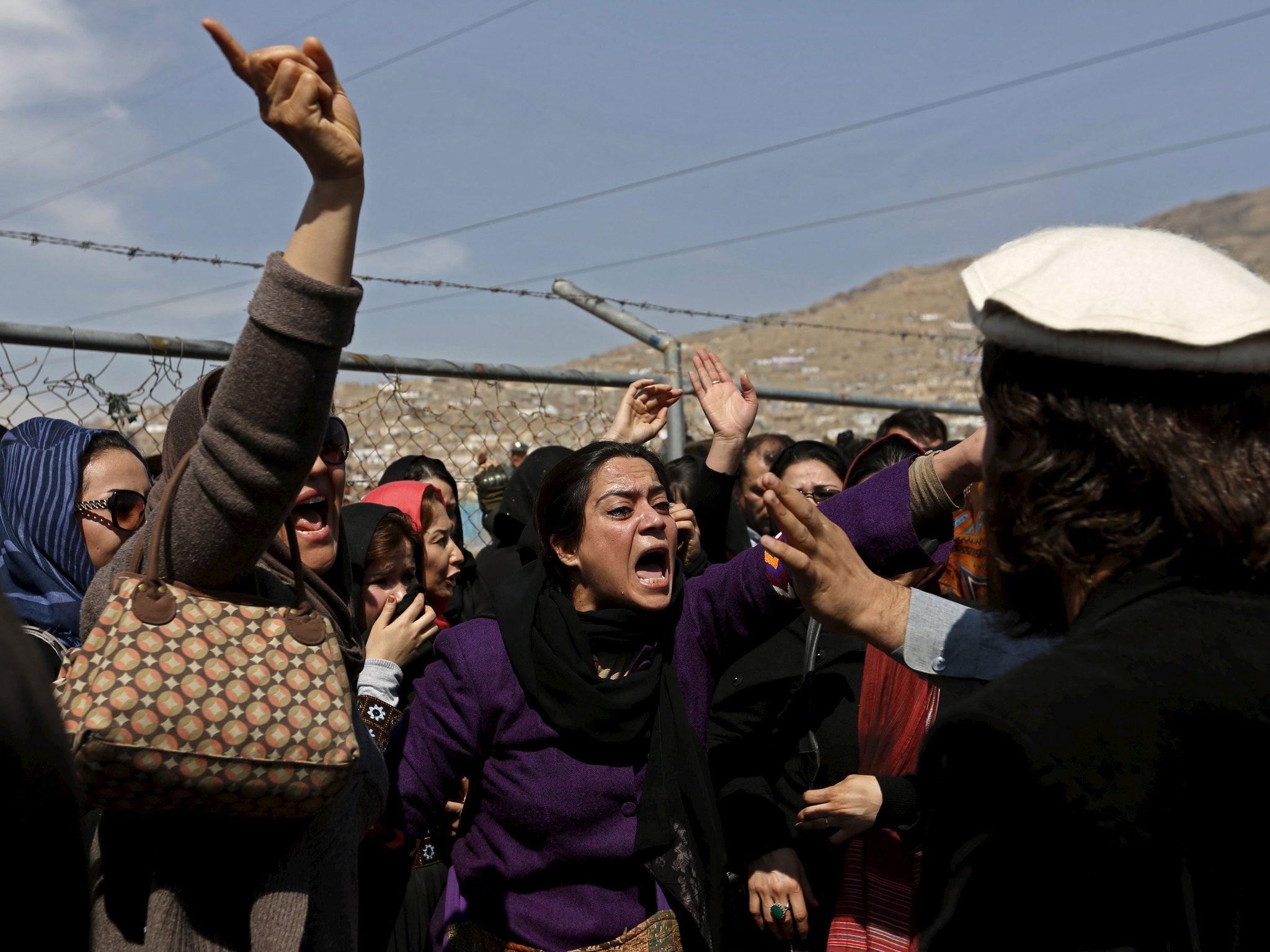Arrested, abducted and tortured: The Taliban betray their promises on women
Exclusive: After more than six months of rule, one campaigner claims the Taliban are now ‘trying to erase women from society’, report Charlene Rodrigues and Matiullah Shirzad in Kabul


Your support helps us to tell the story
This election is still a dead heat, according to most polls. In a fight with such wafer-thin margins, we need reporters on the ground talking to the people Trump and Harris are courting. Your support allows us to keep sending journalists to the story.
The Independent is trusted by 27 million Americans from across the entire political spectrum every month. Unlike many other quality news outlets, we choose not to lock you out of our reporting and analysis with paywalls. But quality journalism must still be paid for.
Help us keep bring these critical stories to light. Your support makes all the difference.
Zeinab Zazay* woke up in a pool of blood in a cold and dank Taliban-run cell and begged God for death.
She was beaten with a cable, punched and kicked into the small hours of the morning, forced to confess on recorded video that her unarmed protests in Kabul on 19 January chanting bold slogans ”food, work, freedom,” were “sinful and wrong”.
If she resisted or spoke to the press, the Taliban threatened to kill her and her family. “There are no words to describe what they did to me,” Ms Zazay told The Independent after she was released last week, a shadow of her former anarchist political self.
Arbitrary arrests, abductions and torture of young educated women from their homes and workplaces, like Ms Zazay’s, have become routine after the Taliban swept over Kabul in late August last year.
Taliban spokesperson Zabihullah Mujahid back then promised he would honour women’s rights, without spelling out the details on rights to work and study. But six months after seizing the capital, evidence shows the Taliban are forcibly abducting women from their homes, workplaces, arbitrarily detaining and torturing them.
Ironically, on Tuesday, Mr Mujahid tweeted: “The Islamic Emirate is committed to upholding the Sharia rights of all Afghan women. International Women’s Day is a great opportunity for our Afghan women to demand their legitimate rights. We protect and defend the rights of our Afghan women, God willing.”
The Independent spoke to five women who were released in recent weeks and recounted their harrowing experiences in Taliban-run detention sites. Visible scars in photos seen by The Independent show women’s ribs are mutilated, nails plucked, blood clots around their eyes, arms and legs are wrapped in a white cast.
‘Taliban are trying to erase women from society’
Samira Hamidi, Amnesty’s Afghanistan campaigner, said there are no confirmed figures available in terms of total detained women. Official records state that around 33 women were detained in Kabul, all of them protestors.
Ms Hamidi said the women have been released on condition they do not speak about the Taliban or against the Taliban’s violence during detention. “These women and their families' paperwork like passports have been confiscated by the Taliban which means they cannot leave the country,” Ms Hamidi said.
Afghan politician and former ambassador to Norway Shukria Barakzai said what the Taliban say and what they are doing are two different things.
“Taliban are trying to erase women from society,” Ms Barakzai said.
“Every single day, they are trying to limit the women’s movement and generally they don’t like to see women – not in government or as a non-government organisation – but also they don’t want to see women in schools and universities.”
Taliban-run prisons where the women were detained include the Interior Ministry, the national security jail in Shash Darak, and Badambagh, areas on the outskirts of Kabul.
The arbitrary arrests are not only restricted to the capital, extending to Herat, Balkh and Kapisa. Activist Alia Aziz is still locked up in a Taliban-run prison in Herat.
“I am increasingly concerned about the wellbeing of missing women activists in Afghanistan. Several have ‘disappeared’, some not heard from in weeks,” UN secretary-general, António Guterres said on Twitter last month.
Last December, the de facto Taliban government issued a decree that bans forced marriage and stated that women should not be considered as property. Ms Barakzai said they don’t have the institutions to follow the implementation of those orders.
Afghanistan only began having elections since 2001 where women were allowed to vote. The first school for girls was the Ashia Durani high school which opened in the mid-1960s. Women now fear they are at risk of losing the simple freedoms they were afforded.
The Taliban reneged again on their promises for women and girls’ education by coming up with a litany of obstacles: insufficient female staff to teach students, teachers’ unpaid salaries and, more recently, they introduced restrictions on men and women’s dress codes. Women have to compulsorily wear hijabs and men are required to grow a beard, Ms Barakzai said.
“I think women and people of Afghanistan are mentally, physically and verbally tortured by Taliban. This is systematic discrimination and violence against women which has been going on and the silence of international community and organisations has been sad.”
She said the situation for women has completely changed in the past seven months but the reality is the only resistance against the Taliban has been Afghan women.
‘Prostitute and infidel’
Karima Arian’s family’s efforts to stop her abduction were in vain.
“I implored them not to take me because my mother would have a stroke. They pulled out their guns and threatened to kill me,” she said.
Ms Arian found herself thrown into a car squeezed between two stocky men. One, wearing a mask, sat near the driver. They physically assaulted her until she lost consciousness. When she woke, she found herself being either interrogated or physically and mentally abused on her way to the prison. The Taliban shouted insults and called her a “prostitute and an infidel”, until they arrived at the prison.
Several days and nights passed in the cell where repeated interrogations and beatings followed. Inside, while praying, she heard the loud sobs of other women. Same questions, different Taliban officers. Access to family was limited and legal help did not exist. Ms Arian said she was offered food and water and whipped if she didn’t consume any.
The Taliban wanted to know about Ms Arian’s political leanings, which foreign institutions were supporting her, and which countries or political leaders were providing financial help. Unable to solicit a response after repeated torture, they covered the prison’s CCTV cameras because Ms Arian says, she was a girl.
We Afghan women believe Taliban is right now the international community’s gift to us. They brought the Taliban in power in past three years
Ms Barakzai is an outspoken figure on women’s rights and was forced to abandon her country last summer over fears for her security. “Taliban are the enemy of women, they will not change their behaviour,” she said, urging the international community to listen to the voice of Afghan women. “If they had spoken to us, Afghanistan would not have had a terrible difficult time.”
Ms Barakzai said they have to be loyal and honest, talk with the Afghan women directly and not on behalf of them, and also talk with the Taliban.
“We Afghan women believe Taliban is right now the international community’s gift to us. They brought the Taliban in power in past three years.”
It’s time for them to take serious action, otherwise, there will be ‘gender apartheid’ in Afghanistan and women and girls will lose what little freedom they have now
The freed women live like caged birds, days after their release, traumatised without mental health support. Were it not for intervention from the international charity organisations, they would be languishing behind bars, Ms Arian says.
For the last six months, Ms Hamidi said the international community has watched on as the situation has deteriorated heavily. “It’s time for them to take serious action, otherwise, there will be ‘gender apartheid’ in Afghanistan and women and girls will lose what little freedom they have now.”
Still, Ms Barakzai said, despite the torture of the women they are the only voice of resistance in Afghanistan. Afghan women have been at the forefront of fighting for their rights for centuries.
“Regardless of all the Taliban government’s tricks and techniques (shootings, physical assaults, arrests, torture) women will resist, they will raise their voices. Women of Afghanistan are not going back.”
The Independent approached the Taliban for comment.
*Names have been changed to protect women’s identities
Join our commenting forum
Join thought-provoking conversations, follow other Independent readers and see their replies
Comments